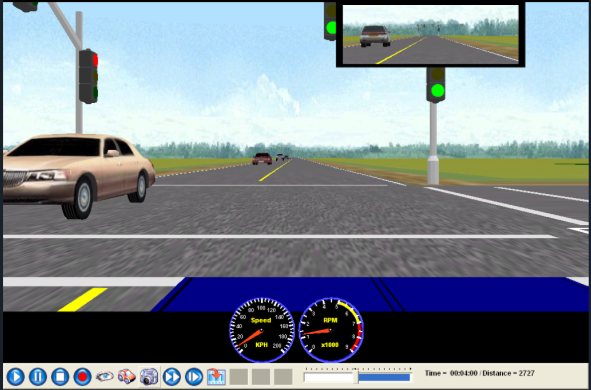Virtual Reality (VR) and Driving Performance
Dr. Graham is interested in the development of specialized fMRI procedures that enable improved assessment of \"ecologically valid\" (real-world) behaviour, moving beyond reductionist approaches that rely on simple sensory stimuli and button-press responses. Our laboratory was among the first to combine virtual reality (VR) technology with fMRI to create more realistic brain activity maps.

A view from the \"virtual driver seat\" created using STISIM software with our fMRI-compatible driving simulator apparatus from Kan et al., Medical Physics (2012).
VR Driving Simulator
One of our latest innovations is an fMRI-compatible virtual reality driving simulator, developed in collaboration with Dr. Tom Schweizer at St. Michael’s Hospital. This project aims to investigate how driving task complexity and distraction affect behavior and brain activity.
Key Applications
- Traumatic brain injury, Alzheimer’s disease, and stroke patients.
- Developing new metrics for assessing fitness-to-drive for physicians.
- Creating rehabilitation techniques that support recovery of cognitive and physical driving abilities.
Recent Publications
Guan, D. X., Churchill, N. W., Fischer, C. E., Graham, S. J., & Schweizer, T. A. (2024).
Frontiers in Aging Neuroscience, 16, 1369179. https://doi.org/10.3389/fnagi.2024.1369179
Yuen, N. H., Tam, F., Churchill, N. W., Schweizer, T. A., & Graham, S. J. (2021).
Frontiers in Human Neuroscience, 15, 659040. https://doi.org/10.3389/fnhum.2021.659040. PMID: 34483861
Hird, M. A., Churchill, N. W., Fischer, C. E., Naglie, G., Graham, S. J., & Schweizer, T. A. (2018).
Geriatrics, 3(2), 20–20. https://doi.org/10.3390/geriatrics3020020
Hird, M. A., Vesely, K. A., Fischer, C. E., Graham, S. J., Naglie, G., & Schweizer, T. A. (2017).
Journal of Alzheimer’s Disease, 56(2), 447–452. https://doi.org/10.3233/JAD-160995. PMID: 27983557
Hung, Y., Vetivelu, A., Hird, M. A., Yan, M., Tam, F., Graham, S. J., Cusimano, M., & Schweizer, T. A. (2014).
Neuroscience Letters, 558, 41–46. https://doi.org/10.1016/j.neulet.2013.10.065